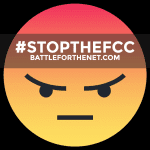 A vote by the F.C.C. that threatens to end net neutrality rules that prohibit internet service providers like AT&T and Comcast from blocking or slowing sites or for charging people or companies for faster speeds of particular sites, is going down at the end of this week.
A vote by the F.C.C. that threatens to end net neutrality rules that prohibit internet service providers like AT&T and Comcast from blocking or slowing sites or for charging people or companies for faster speeds of particular sites, is going down at the end of this week.
Tragically, the principles of net neutrality may be going down with it!
Companies like Reddit, Etsy, Tumblr, and Kickstarter have posted calls for action on their Websites and grassroots protest efforts are taking shape at BattlefortheNet.com
But where are the big players in the industry?
Companies like Facebook and Google appear to have taken a back seat. Their low profile is being attributed to the withering criticism each has taken from a dysfunctional Congress in the “other” Washington.
A spokesperson for Public Knowledge, a nonprofit group that supports net neutrality, said the biggest tech companies are less vocal because they are facing more regulatory battles than in previous years.
Social media sites have been criticized for allowing foreign actors to interfere in the presidential election of 2016.
The biggest tech companies are also facing complaints from some lawmakers that they have become too large and powerful.
Such reticence appears to give up the greater fight for the greater good — and greater justice for all.
The chance of tipping the scales of justice back in the direction of the people appears increasingly remote. It’s likely, however, that Pai’s proposal will head to court — which has been the fate of all past efforts at net neutrality.
The three Republican members of the F.C.C., who make up a majority of commissioners at the agency, have committed to roll back the landmark broadband rules created during the Obama administration. Elections do have consequences. The Trump administration continues to wreak havoc on almost every public institution and policy supported by its predecessors, no matter the principle. So much for supporting the “little guy” over the commercial interests of major corporations.
Amazon Taking Case to the F.C.C.
Amazon representatives have been lobbying F.C.C. commissioners and staff in person, with visits on Nov. 29 and last Wednesday. The latter included a meeting between Ajit Pai, the F.C.C. chairman, and Darren Achord, an Amazon senior public policy manager.
“During the meetings, we stated that Amazon has long supported net neutrality protections to ensure our customers can enjoy an open internet, and we emphasized that the company remains committed to that position,” Gerard Waldron, a lawyer who represents Amazon and participated in the meeting, wrote in an account filed with the F.C.C.
“We stressed the need for enforceable, bright-line rules to protect the open internet and guard against anti-consumer and anti-competitive activities,” he wrote, adding that Amazon opposed the commission’s proposed change.
Microsoft Weighs In But Keeps Low Profile
Microsoft sent a 23-page letter to the commission late in July outlining the company’s argument that the commission should not change its stance on net neutrality.
“Now is not the time for the commission to abandon 15 years of progress toward protecting the economic future of our country,” the letter said. “Now is not the time for the commission to abandon its open internet rules.”
The company has otherwise kept a relatively low profile on the issue.
On Nov. 28, Brad Smith, Microsoft’s president and chief legal officer, tweeted that “Microsoft believes in preserving the open internet & opposes weakening net neutrality protections.”
Apple Steps into the Ring
Apple is a relative newcomer to the net neutrality debate having first filed an opinion with the F.C.C. in August. It argues against the creation of fast lanes and emphasizing the importance of an open internet.
Tim Cook, Apple’s chief executive, said in a statement that all internet service providers should treat all data on the internet equally.
“Equal treatment is critical to innovation in a digital economy and to democracy,” he said. “If the F.C.C. doesn’t provide this basic protection, we urge Congress to intervene.”
Where is Facebook?
This week, Facebook offered a statement from Erin Egan, a policy spokeswoman, about the F.C.C. plans:
“Facebook has always supported the kind of strong net neutrality protections that will ensure the internet remains open for everyone,” Ms. Egan said.
“We are disappointed by the F.C.C.’s decision to remove these protections, and we stand ready to work with policymakers on a framework that will protect a free and open internet.”
Google Backs Down
Google has kept a pretty low profile in the recent net neutrality debate. The company issued a statement last month when the proposed changes were announced, saying that the current rules were “working well” and that it was “disappointed” by the new proposal.
It’s a restrained approach compared with Google’s aggressive lobbying campaign in 2006 when Sergey Brin, one of the company’s co-founders, went to Capitol Hill to argue for the importance of net neutrality.
In 2010, Google teamed up with Verizon to lay out a vision for how net neutrality could work, advocating against allowing internet service providers to provide fast lanes to people who pay more. However, the proposal was criticized by advocates of an open internet because it excluded wireless connectivity and new services from broadband providers.
Netflix, once among the most vocal of net neutrality boosters, is perhaps the most conspicuous in its relative silence.
In recent months, the company’s chief executive, Reed Hastings, has said that net neutrality is no longer the company’s “primary battle,” partly because Netflix is now large enough that it can secure the deals it needs with internet access providers to ensure its service is delivered smoothly to customers.
On Nov. 21, the company posted a note on its primary Twitter account in support of net neutrality.
To find out how YOU can protest and send a message, visit BattlefotheNet[24×7]




















